French society’s relationship with remembrance
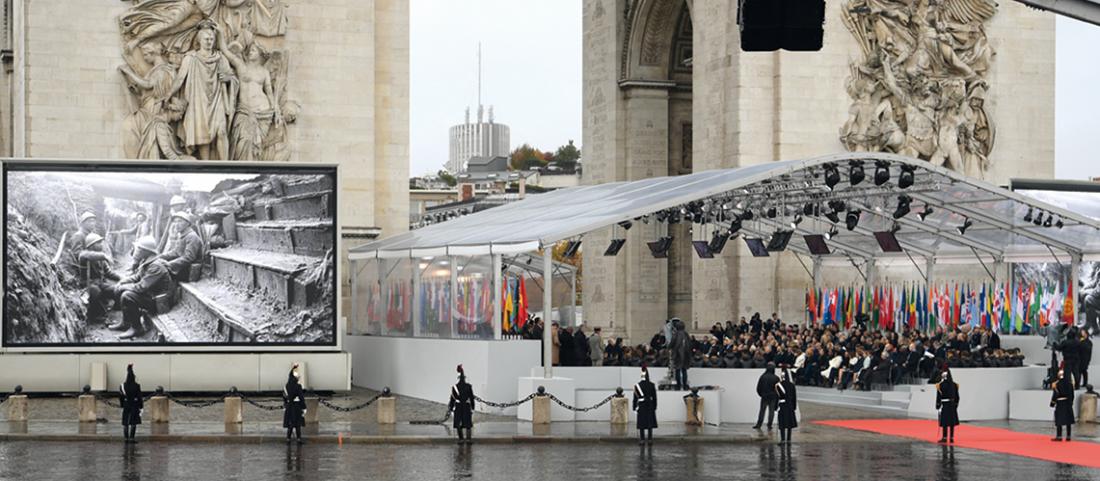
If the French have a definite taste for the history and remembrance of the events of their past, that taste varies according to the conflict and the people. It is expressed primarily through commemorative acts.
To describe French society’s relationship with remembrance is, on the face of it, straightforward enough: “The French are passionate about the past.” (Author’s note: the term “the French” refers here to “French society” and includes women and men who do not hold French nationality.) This statement is evidence. It often goes hand in hand with two apparently contradictory ideas. Firstly, that remembrance in France constitutes one of the cornerstones of the collective bond between citizens, regardless of their differences. Secondly, that the story of the past is a recurring theme in political conflicts and media controversies in the public arena.
While it is impossible to resolve this paradox in the space of a short article, it invites us to ask the following questions: What memory or memories is French society interested in? And what do the French think about the act of remembrance itself? Around a hundred opinion polls taken over the last ten years offer some answers to these two questions [1].
War is at the heart of French society’s relationship with remembrance
Each individual’s relationship with remembrance depends on a whole series of factors, including socio-economic, generational, residential, gender and partisan characteristics. Even so, the two world wars, and in particular the Second, constitute a widely shared historical reference. Every year since 2016, Programme 13 Novembre and Crédoc have asked French people: “What, in your view, is the most important historical event to have taken place in France or around the world since 1900?” [2] In January 2021, although Covid-19 dominated the media and was cited by 16% of people, the Second World War won hands down, with a total of 33% of mentions. The First World War came in second place, with 13%. Already by 2017, the Second World War – and to a lesser extent, the First – accounted for 34% of responses to a similar question, while the Algerian War saw only 1% and terrorism just 10%, despite dominating the news at the time [3].
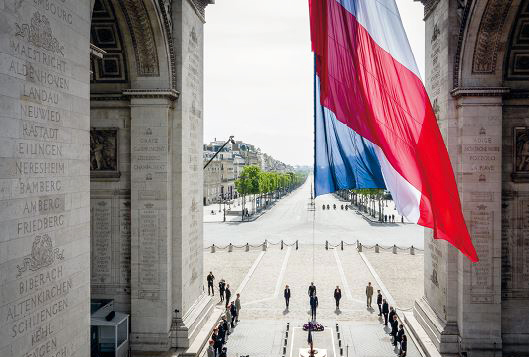
Ceremony to mark the 75th anniversary of V-E Day (8 May 1945), Paris, 8 May 2020. © Laurent Blevennec/Présidence de la République
In May 2020, a survey carried out in 28 countries demonstrated once more the importance of Second World War remembrance to French people [4]: 69% said it was important for there to be ceremonies to mark the 75th anniversary of the Allied victory over Nazi Germany, compared to just 7% who said it was not. The centrality of the Second World War for French society is apparent not only in absolute figures but also comparatively: 53% of French people believe the conflict “still concerns them today”, against 34% of Germans. And going back to May 2015, 92% of people questioned in France thought that the 70th anniversary of the German surrender of 8 May was an important date to commemorate, compared to 78% in Germany [5]. Finally, besides strengthening a feeling of shared destiny as a Nation, Second World War remembrance constitutes the main source of French people’s feeling of belonging to Europe. Still in 2015, 78% of French people thought “the Second World War created a need for unity in Europe”, against 56% of Germans [6]. And 69% of those questioned in France said they were attached to Europe “as an area of shared history and heritage”, compared to only 44% where Europe was presented as “a political institution” [7].
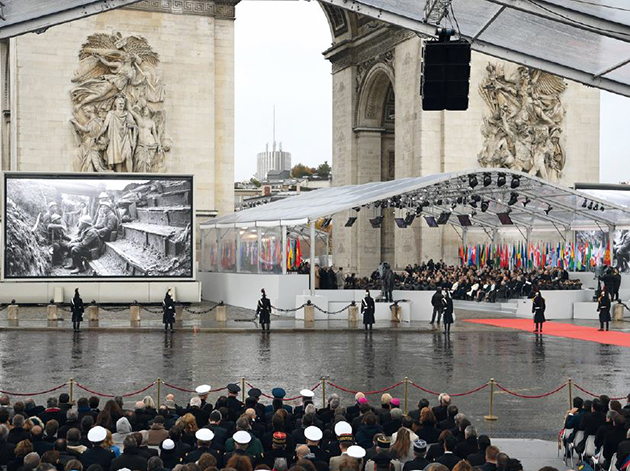
First World War Armistice centenary ceremony, Paris, 11 November 2018. © Eric Feferberg/AFP
Last of all, although the First World War occupies a less prominent place in French people’s memory, it is still important to them. On the First World War Centenary, in November 2018, for instance, 46% of people questioned said they planned to watch the broadcast of the remembrance ceremonies [8]. The word “war”, then, is by far the most common spontaneous answer given by French people who are asked which words come to mind when they think about “history, i.e. the study of past events” [9]. For French society, remembrance is first and foremost about war, and in particular the two World Wars.
French society’s adherence to the principle of commemorations
Besides the historic events themselves, the French population is overwhelmingly in favour of the principle of preserving the collective memory. In January 2016, 85% of French people agreed with the statement “It is crucial for key past events to be commemorated in France, in order to pass on their memory to the younger generation” [10]. This adherence to the principle of commemoration goes beyond the memory of the two World Wars. For instance, in 2012, 81% of those questioned felt it was “justified” that a “remembrance ceremony” should be held to mark the 50th anniversary of the end of the Algerian War, attended by the French President [11]. However, besides the two World Wars, public opinion appears less decided as regards the principle of annual commemoration of historical events. In 2017, 93% of French people thought that V-E Day should “be commemorated every year” and 89% felt the same about Armistice Day. Yet far fewer were in favour of annual ceremonies in honour of the terrorist attacks of 13 November 2015 (53%), the end of the Algerian War (44%) or the civil unrest of May 1968 (36%) [12].
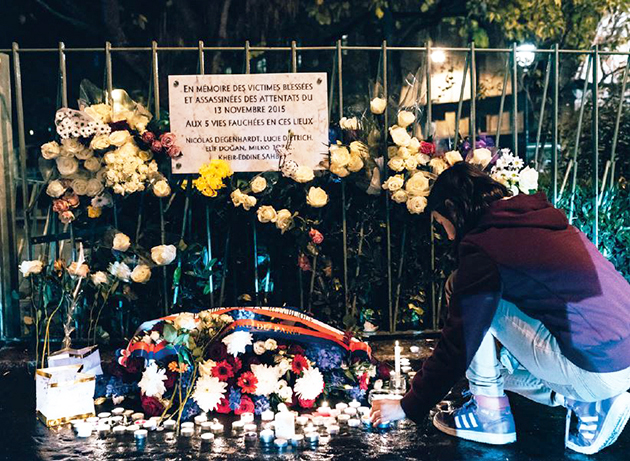
Candles are lit before the commemorative plaques in memory of the victims of the terrorists attacks of 13 November 2015,
on the first anniversary of the tragedy, Paris, 13 November 2016
© Denis Meyer/Hans Lucas/Hans Lucas via AFP
That said, in its expectations concerning the annual commemorations of the world wars, French society makes something of a distinction between the two events. In 2011, asked about the plan to introduce a “memorial day” [13], 64% of French people approved of the idea, while 36% said they were in favour of keeping the date of 11 November, to avoid “minimising the distinctiveness of the First World War”. On this point, there was a clear distinction between age groups, with 45% of under-35s wanting to preserve the distinctive character of 11 November, and only 26% of over-65s..
The “younger generation” are the group particularly targeted by the commemorations. In this regard, young people in France appear more sensitive than elsewhere to these tools of remembrance. A wide-reaching comparative survey carried out in 2015 with 16 to 29-year-olds offers some interesting insights [14]. Respondents were asked, in two separate questions, “How did you acquire your knowledge of the First World War/Second World War?” The options included “through the commemorative ceremonies”. Few young people chose this answer. Of the 31 countries surveyed, only seven had a percentage of 10% or more. Yet 15% of French young people said one of the ways they had acquired their knowledge of the First World War was through the commemorations, compared to 2% of Germans and just 9% of British, even though at the time the centenary commemorations were in full swing across the Channel. The proportion is the same for the Second World War commemorations, with 14% of French youngsters citing them as an effective remembrance tool, against 1% of Germans and 8% of British.
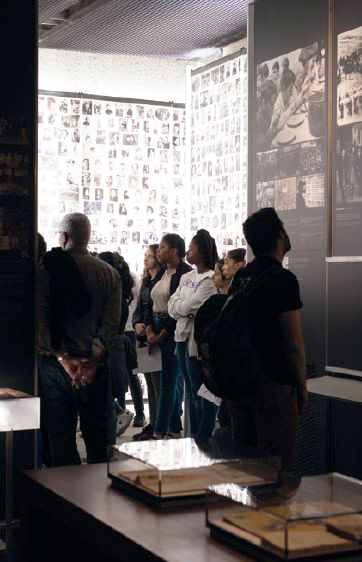
A school group visits the permanent exhibition at the Shoah Memorial, Paris, 17 June 2019.
© Mémorial de la Shoah/Photo Colombe Clier
This relative adherence of French society to the effectiveness of commemorations is also found among the adult population. In 2015, when asked, “When you think about the Second World War, do you think about it through...”, 31% of respondents in France answered “the commemorations”, compared to 24% in Germany [15]. A survey on “information resources on the Jewish genocide” similarly highlights the importance of commemorations, since they come after school and documentary and fiction films and books, just after learning from family members (17%), level with the press and media (16%), and before museums and exhibitions and the internet [16]. This relative attachment to commemorations is also apparent in the 24% of respondents who considered them to be one of the “best ways to preserve the memory of key events in the history of France” [17].
What, then, does French society see as the future of remembrance? In January 2016, 59% of French people said that “not only positive events displaying the values of heroism and freedom should be preserved in the collective memory” [18]. The number was highest (70%) among 18 to 24-year-olds and lowest (55%) among the over-65s. In 2019, 57% of French people thought that slavery and the slave trade were not talked about enough. This opinion was held by 60% of 18 to 24-year-olds, compared to 56% of the over-60s [19]. The existing data shows that young people are not only very strongly attached to the principle of commemorations, in particular the two World Wars, but are also in favour of a greater diversity of commemorated pasts. What the future holds for remembrance remains to be seen.
Sarah Gensburger, research director at CNRS
and author (with S. Lefranc) of À quoi servent les politiques de mémoire ?, Presses de Sciences Po, 2017.
A few surveys of what the French think of remembrance, cited in the articl
1 A systematic search of the IFOP, IPSOS, BVA, CSA, Harris Interactive, Odoxa, Viavoice and YouGov websites was carried out, using the key words “remembrance”, “commemoration” and “history”. The search produced 121 surveys covering the period 1986-2021. It was carried out by Yseult Lesage, as part of her internship at the Institut des Sciences Sociales du Politique (UMR 7220). The surveys that follow were all carried out using representative samples according to the quota method and, unless otherwise stated, with people aged 18 and over.
3 Les Français et la mémoire collective, IFOP survey, January 2016.
4 75th anniversary of the End of World War II: A Global View, IPSOS survey, May 2020, with people aged 16 to 74. 20% said they had no opinion.
5 1945-2015. France-Allemagne : de la guerre à l’Europe, Mémoire de guerre et idée européenne, Viavoice survey, sample of 1000 people in France and 1000 people in Germany.
6 1945-2015. France-Allemagne, Op. cit.
7 Le regard des Français sur l’Europe, sondage l’IFOP, October 2016.
8 Les Français et le centenaire de l’Armistice de 1918, BVA survey, May 2018.
9 Les Français et l’Histoire, Harris Interactive survey, February 2019.
10 Les Français et la mémoire collective, IFOP survey, January 2016.
11 Les Français et la commémoration de la fin de la guerre d’Algérie, IFOP survey, January 2012.
12 Les Français et la commémoration de différentes événements historiques, IFOP survey, November 2017.
13 Les Français et le projet d’instaurer un "memorial day", IFOP survey, September 2011.
14 Mémoires d’avenir. Enquête sur la mémoire du XXe siècle, Fondation pour l’Innovation Politique and Fondation pour la Mémoire de la Shoah.
15 1945-2015. France-Allemagne : de la guerre à l’Europe, Mémoire de Guerre et Idée Européenne, op. cit.
16 L’Europe et les génocides : le cas français, survey by IFOP and Fondation Jean-Jaurès, November 2018.
17 Les Français et l’Histoire, BVA survey, February 2016.
18 Les Français et la mémoire collective, Op.cit.
19 CNDH, La lutte contre le racisme, l’antisémitisme et la xénophobie. Année 2019, 2020.

